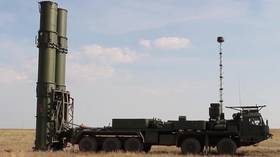Biden’s decision not to punt on ‘Russian bounties’ is embarrassment for US media – but they’ll continue to push favored narrative

The mainstream media didn’t find it incongruous that the US walked back a claim that Russia placed bounties on US troops in Afghanistan on the same day it sanctioned Russia on the basis of another set of evidence-free accusations.
The CIA now only has “low-to-moderate confidence” that Russia paid the Taliban to kill American servicemen in Afghanistan, it was reported on Thursday.
On the same day, the Biden administration announced a new raft of sanctions against Russia as punishment for its “efforts to undermine the conduct of free and fair democratic elections and democratic institutions in the United States and its allies and partners; [and to] engage in and facilitate malicious cyber activities against the United States and its allies and partners.” Russia was said to have interfered in the 2020 US election and to be behind the so-called SolarWinds hack.
Also on rt.com US imposes new sanctions against Russia, expels ten diplomats & targets national debt in move Moscow may view as major escalationThe Biden administration – targeting Russia’s sovereign debt – barred American financial institutions from buying rouble bonds issued after June 14 by any Russian federal financial authority. The US government “designated” six Russian technology companies that allegedly “provide support to the Russian Intelligence Services’ cyber program.” It also sanctioned 32 entities and individuals supposedly “carrying out Russian government-directed attempts to influence the 2020 US presidential election, and other acts of disinformation and interference.” In addition, the government sanctioned eight individuals and entities “associated with Russia’s ongoing occupation and repression in Crimea.” Finally, Washington announced the expulsion of 10 Russian diplomats who were allegedly spies.
One striking omission, however, was the absence of any sanctions against any Russians who might have been involved in paying bounties to the Taliban to kill American servicemen. One day earlier, the New York Times had led its readers to expect just such sanctions. These sanctions would be in response “to the CIA’s assessment that Russia offered to pay bounties to militants in Afghanistan to kill American troops.”
Biden, the Times said reassuringly, would not be like Trump. He wouldn’t just let the Russians get away with murdering Americans:
“The CIA presented the Trump administration with an intelligence assessment that Russia had covertly offered to pay bounties to militant fighters to incentivize more killings of Americans in Afghanistan. But while the National Security Council at the Trump White House initially led an interagency effort to come up with response options, months passed and the White House did not authorize anything – not even the mildest option, delivering a diplomatic warning.”
Also on rt.com White House admits lack of confidence in DEBUNKED story about Russian bounties – after Biden repeatedly used it to attack TrumpTrump put the interests of Russia ahead of those of the United States. Not so Biden.
So, what happened? On Afghanistan, the Biden administration chose to demur: “Given the sensitivity of this matter, which involves the safety and well-being of our forces, it is being handled through diplomatic, military and intelligence channels. The safety and well-being of US military personnel, and that of our allies and partners, is an absolute priority of the United States.”
What did that mean? Russians had allegedly paid Afghan militants to kill Americans, and the United States was taking a pass. Doesn’t that sound like, well, like President Trump? Later in the day, the New York Times disclosed what the problem was. Apparently, just as the Trump administration had claimed, the evidence as to bounties on the heads of American servicemen was less than compelling. The new administration had “sent diplomatic messages to Russia expressing concern” about the reports of bounties. “But a senior official said intelligence agencies only had low-to-moderate confidence in their assessment, because it was based in part on information from detainees.”
Let us recall that the New York Times had played a key role in disseminating the Russia-bounties story. Back in June 2020, in the middle of the presidential election, the Times breathlessly reported: “American intelligence officials have concluded that a Russian military intelligence unit secretly offered bounties to Taliban-linked militants for killing coalition forces in Afghanistan – including targeting American troops – amid the peace talks to end the long-running war there, according to officials briefed on the matter.”
The intelligence assessment was “said to be based at least in part on interrogations of captured Afghan militants and criminals.” Trump had been briefed on the matter and officials had “developed a menu of potential options,” but “the White House has yet to authorize any step.” Officials “familiar with the intelligence did not explain the White House delay.” Unlike some of his closest advisers, the paper mumbled darkly, “Mr. Trump has adopted an accommodating stance toward Moscow.”
Also on rt.com Fake news all along: Confidence game with ‘Russian bounties’ story shows one shouldn’t trust spies & self-serving mediaThis then was continuation of Russiagate: assertions about malevolent Russian activities and an alleged Trump-Putin plot, all made by anonymous or retired officials, with very little by way of supporting evidence. Within days of the original report, the Times followed up with a report claiming that US intelligence officials had “intercepted electronic data showing large financial transfers from a bank account controlled by Russia’s military intelligence agency to a Taliban-linked account, evidence that supported their conclusion that Russia covertly offered bounties for killing US and coalition troops in Afghanistan, according to three officials familiar with the intelligence.”
Continuing to rely on anonymous intelligence officials, the paper asserted that information about the Russian “program” had come from detainees under interrogation in Afghan prisons. $500,000 had been found in the home of a businessman who was said to be a middleman between the GRU and the Taliban.
The Times was on the story, like a dog on a bone. When the Trump administration’s National Intelligence Council prepared a memo on the Russia-bounties allegation, suggesting that there were serious gaps in the evidence, the Times poured scorn on it. Citing anonymous officials, the paper claimed that the memo contained no new information and that “its timing and its stressing of doubts suggested that it was intended to bolster the Trump administration’s attempts to justify its inaction on the months-old assessment.”
Common sense should have suggested that the story was ludicrous from the start. Why would the Taliban need financial inducements to kill American soldiers? Why would it be in Russia’s interest to provide such inducements? It would only serve to undermine the February 2020 Doha agreement with the Taliban and lead to an indefinite extension of the US military presence in Afghanistan.
Also on rt.com Biden's Russia policy ludicrous, unbelievable, contradictory & unprecedented: First offers Putin summit & then imposes sanctionsMoreover, why would Russia’s intelligence services be so foolish as to wire money to Islamic militants given that the US actively monitors all global electronic financial transactions? Furthermore, the evidence for Russian “payments” came from militants sitting in Afghanistan government prisons. Both prisoners and Afghan government agents had every incentive to make up such a story. The government in Kabul was anxious to find a reason to persuade the US to stay in Afghanistan, and prisoners were keen to tell a story their captors were eager to hear.
However, facts, evidence, common sense played very little role during the Russiagate years and they played very little role here. The “Russian bounties” story outline was too good to let go. The US was in the middle of an election and the Democrats, along with their media acolytes, eagerly seized on the story as further proof of the existence of a nefarious, clandestine alliance between Trump and Putin. Russian-bounties became a favorite talking point among Democrats. Susan Rice, former Obama national security adviser and current Biden domestic policy adviser, had no doubt as to what it all meant:
“The message to Vladimir Putin is you can kill American servicemen and women with absolute impunity… The president of the United States has demonstrated absolutely callous disregard for the safety and security of American forces in a war zone and there's no explanation for this. Now we learn that even when it comes to the blood of American service members, this president picks Putin over our troops.”
During one of the presidential debates, Biden confronted Trump, declaring: “I don’t understand why this president is unwilling to take on Putin when he’s actually paying bounties to kill American soldiers in Afghanistan, when he’s engaged in activities that are trying to destabilize all of NATO.” Former president Obama also got in on the act: “When Russia puts bounties on the heads of our soldiers in Afghanistan, the commander-in-chief can’t be MIA.”
That not a single American soldier had been killed in Afghanistan since the signing of the Doha agreement did nothing to still the accusations against Trump, any more than did the statement of General Kenneth McKenzie, head of US Central Command, that he had failed to find any evidence tying Russian payments to US military deaths. He couldn’t find a “causative link.” The intelligence case “wasn’t proved to me,” he said. “It wasn’t proved enough that I’d take it to a court of law – and you know that’s often true in battlefield intelligence.”
That Biden had chosen to punt on the Russian bounties was a huge embarrassment for the US media, and the New York Times refused to let it go. It couldn’t. So, later in the day, it published yet another story, titled “White House Warns Russia on Bounties, but Stops Short of Sanctions.” The sub-head read: “The available evidence supporting a stunning CIA assessment – which President Donald J. Trump’s inaction on prompted bipartisan uproar – remains less than definitive proof.” This was a mea culpa of sorts. Citing unnamed former intelligence officials, the reporter claimed that “it is rare in the murky world of intelligence to have courtroom levels of proof beyond a reasonable doubt about what an adversary is covertly doing.” That may very well be true. But it means that it is incumbent on the media to treat intelligence reports with skepticism and to emphasize how inconclusive it is. That is precisely not what the media do.
There is no better example of this than the media’s coverage of the SolarWinds hack or Russia’s alleged interference in the 2020 election. The media have been reporting without any questioning US intelligence claims as to Russia’s responsibility. There have been no demands to see evidence; no questioning as to how definitive attribution of a hack can be; no questioning of what “election interference” might even mean.
For three years, the media reported one absurd story after another about a supposed collusion between the Trump campaign and the Russian government, until the Mueller report demonstrated that there was no basis for those claims. It turned out that there was no evidentiary basis even for the story that launched Russiagate: Russia’s alleged hack of the DNC. During his December 2017 testimony before the House Intelligence Committee, Shawn Henry, president of CrowdStrike, admitted that there was no conclusive evidence that the DNC servers were hacked, by Russia or by anyone else.
Sadly, we can be sure that the media will continue to rely unquestioningly on the evidence-free assertions of anonymous government officials as long as they are pushing a narrative the media favor.
Think your friends would be interested? Share this story!
The statements, views and opinions expressed in this column are solely those of the author and do not necessarily represent those of RT.















